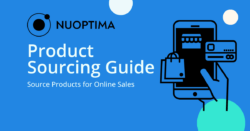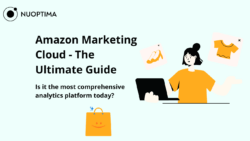Key points
- Finding the right supplier is crucially important to building a strong Amazon FBA wholesale business. It’s an essential step both for product-based and wholesale-based strategies.
- There are three most common types of wholesale suppliers on Amazon: manufacturers, Amazon FBA wholesale distributors, and dropship Amazon suppliers. Wholesale suppliers sell products in bulk, manufacturers produce the product themselves, and dropship sellers send the item to the merchant’s customers directly without the seller’s involvement.
- Wholesalers can be found on different websites, social media groups and tradeshows. The most popular B2B websites are Alibaba, DHgate, eWorldTrade, Global Sources, and Amazon Business.
- To choose a wholesaler, look at different criterias such as reputation, product quality certificates, the price of the product, logistics and shipping duration, and return and insurance policies.
Amazon can be a very profitable source of income if used correctly. In order to have a thriving business on Amazon, it’s important to decide on what product your business is going to sell, pick a marketing strategy, and find a reliable wholesaler to source the product. Choosing the right product and a dependable supplier will serve as a base for building a successful marketing strategy and increasing your profits.
Keep on reading to discover all the necessary information about types of suppliers, their pros and cons, where to find them, and how to work with them.
#1 Product-Focused Strategy
Taking the product-centred approach means that you’re putting all your time and effort into finding a perfect product to sell. This concept works well for small-scale business operations and concentrates on product listings and PPC campaigns, as well as attracting traffic to the product listing. In order to find a perfect product, look through best-seller or trending lists as well as customer reviews on e-commerce websites, seller, and consumer forums.
How To Find A Perfect Product To Sell
It’s important to get samples from manufacturers and see whether the product meets your expectations in terms of functionality and quality. Here are some tips on how to avoid product selection mistakes:
- Choose products with good profit margins;
- Avoid Items with high competition as well as oversised, bulk, fragile, and seasonal items;
- Avoid difficult to manufacture and assemble, licensed, or restricted category products;
- Check if the product is in high demand on Amazon;
- Check financial parameters to see how if its price is justified.
There are enough suppliers on the market, but how do you find the right one? First, let’s go over how Amazon FBA works.
How Does Amazon FBA Work?
Amazon sellers have two options when it comes to order fulfilment, and the most popular is FBA, which means Fulfillment by Amazon. This type of fulfilment implies that Amazon takes care of picking, packing, and shipping products you sell, as well as handling customer service and returns.
Here are the steps you need to take to start selling under the FBA program:
- Create an Amazon selling account.
- Log in to Seller Central.
- Create product listings.
- Add a listing to the FBA inventory on the Manage Inventory page.
- Prepare products for transportation to a fulfilment centre and ship them to Amazon.
While Amazon takes care of the fulfilment process under the FBA program, merchants still have some responsibilities, including conducting product and keyword research, creating and optimizing ASINs, advertising their products, managing the Q&A and review sections of the listing page, and refilling stock. If you use the FBA program, your inventory can be stored either in Amazon’s warehouses or at fulfilment centres.
How To Replenish Amazon FBA Inventory
There are two options you can use here: retail arbitrage or wholesale. Retail arbitrage entails buying low-cost products from brick-and-mortar retailers and then reselling them on Amazon at a slightly higher price. However, because sellers buy these products from retail stores, they can’t purchase them in bulk or get as many items as they want.
The other option is the wholesale business model, which allows merchants to purchase discounted products from a manufacturer in bulk. Then these products can be resold as individual units on Amazon. The wholesale option also lets you browse through the manufacturer’s catalogue and find other potentially profitable products that can be bought in bulk. Purchasing items directly from the manufacturer also reduces the risk of you running out of stock. So overall, a combination of Amazon FBA and wholesale looks like a promising e-commerce venture. The hardest and trickiest part is to find legitimate Amazon FBA wholesale suppliers.
As soon as you’ve determined what product you’re going to sell, the next step is searching for wholesale suppliers. The supplier should meet your expectations and deadlines, and more importantly – provide a good quality product. Here are some tips on how to find a good supplier for Amazon:
-
Test The Supplier’s Performance
It’s best to order a smaller amount of product first to check its quality and only then negotiate all the details, including whether the potential supplier is ready to produce a limited amount of product urgently. If you’re searching for a supplier on Alibaba, it’s better to work with English speakers to avoid any miscommunication. -
Reputation Matters
Working with a reputable supplier will be easier since those manufacturers care about maintaining their good standing, and thus, they are less likely to sully their work. -
Find Out More About The Product And The Production Process
Verify the supplier’s business license and ask them about the product and the production process. Make sure that they can ship out the volume of product you need within agreed deadlines. Go over quality control procedures, timelines, and other terms and conditions in the order contract. -
Be Aware Of The Risks
When starting working with a new manufacturer, there are always some risks a buyer should consider. Some of them include receiving low-quality items, payment transaction fraud, choosing the wrong product strategy, or an unreliable supplier or reseller. There’s also a possibility that the product won’t look like the picture.
#2: Wholesaler-Based Strategy
When using this strategy, sellers focus on finding suppliers for large sales volumes. This strategy entails a fast sales pace, big turnover, and significant investments. This can help to sell products in bulk and create a strong business.
Important Criteria When Looking For Suppliers
When the strategy of finding suppliers is based on certain criteria, it makes the whole process much easier and more efficient. Here’s what to look at when choosing an Amazon wholesale supplier:
- Supplier’s reputation and good references;
- Product quality certificates;
- Cost price of goods;
- Logistics and shipping duration;
- Possibility to supply bigger volumes of the product;
- Way of product delivery;
- Return policy;
- Insurance policy.
A good supplier admits their mistake and takes responsibility for solving the problem, welcomes third-party inspection, and is ready to consistently produce the product without sacrificing quality. They should maintain open and direct communication as well as follow ethical rules and regulations.
Amazon Wholesale Suppliers Categories, Pros and Cons
The most common types of wholesale suppliers on Amazon include manufacturers, Amazon FBA wholesale distributors, and dropship Amazon suppliers.
Wholesale Distributors
Amazon FBA wholesale distributors offer products in big consignments, which is a great option for merchants who opt for big FBA wholesale sales volumes.
The biggest advantage of choosing a wholesale distribution is the low cost of the products. The merchants can also get opportunity costs and discounts if buying in bulk, which is crucially important when maintaining sales volumes and competing in the marketplace. Additionally, selling in bulk generates traffic and increases your ranking. Also, this type of supply has a simplified sales process, and it allows the supply of a variety of products in one place.
However, it’s important to monitor the product performance with this type of supply. Wholesale distribution requires money investing upfront in order to start and perpetuate this type of supply. Another disadvantage is the necessity of taking care of inventory management, meaning keeping a sustained sales volume and turnover so that the sellers can reinvest their money further. These aspects require a solid product strategy.
Manufacturers for Amazon
Buying from manufacturers allows the sellers to get the first price, which is usually the best one. This type of supply allows sellers to personalise the product and even create a Private label line of products. Businesses can also set up a solid chain that will prevent them from running out of stock.
However, as with wholesaler distributors, sellers have to invest the money to start the production. Manufacturers are not likely to work with small consignments and are not generous with discounts.
Dropship Suppliers
Dropship sales mean that the supplier sends the items directly to your customers. This type of supply is relatively popular on Amazon as it involves fewer overhead costs. However, there’s less control of the sales process to the seller.
The main advantage of dropship supply is that the suppliers take care of inventory management, which may take up a lot of energy and time, especially for beginners.
Dropshipping is quite flexible when it comes to assortment; therefore, there’s no need to take a risk of ‘sitters’ – the products that don’t sell.
The disadvantage of this type of supply is that the seller has barely any control over the sales process, which is a high risk of shipment mistakes. Additionally, dropshipping results in higher per-item costs.
Factors To Consider When Comparing Suppliers
While looking for a wholesale supplier for your Amazon FBA business, it may be hard to choose between them, especially if all the suppliers are reputable. Here are some things to ask them to see whether they meet your criteria:
- Shipping duration of the products and what shipping company they use
- How they track the packages
- Return policy
- What happens if the product doesn’t arrive?
- Liability insurance certificate
- Standard documents and product certificates if applicable
- References from other merchants who have worked with this supplier
How To Find Wholesalers On Amazon
When it comes to finding wholesalers on Amazon, there are several options.
1. Google
Google search can show thousands, if not millions, of search results and will help to find the right supplier. However, the ordinary search might now work, but there are some tricks that will help to gather all the necessary information. Use quotation marks to add the words in your search query. For example:
wholesale “inventory” “xls”
wholesale “inventory” “xlsx”
wholesale “inventory” “csv”
wholesale “data feed” “xls”
wholesale “inventory” “[location]” “xls”
To exclude a particular category, use a minus symbol before the word:
wholesale “inventory” “xls” – name of the category
Contrarily, add the asterisk symbol to include a search term randomly:
wholesale “inventory” “csv” name of the category*
2. Industry Trade Publications
After using these Google tricks, search for the publication’s website and subscribe to every magazine and blog that targets wholesalers or distributors in a particular industry.
3. Trade Shows
Visiting trade shows is a great option to meet manufacturers in person. The wholesalers present their products at exhibitions so that merchants can check them out. This gives a variety of opportunities since trade shows gather buyers and sellers from different industries in one place. There is a chance of connecting with big brands and suppliers as well.
4. Industry Associations
Industry association is a group where buyers can meet manufacturers of a particular industry. However, it works better for experienced sellers rather than for beginners.
To search the industry association, try putting:
“[name of the industry]” industry association
“[name of the industry]” industry association in “[location]”
5. LinkedIn
LinkedIn is the biggest professional social platform in the world, and it’s also a great place to find wholesale manufacturers.
When searching on LinkedIn, enter in the search box the terms such as:
[name of the industry] manufacturer
[name of the industry] supplier
[name of the industry] manufacturing
[name of the industry] wholesale
[name of the industry] wholesaler
Then go through the distributor’s Linkedin profile and send them a message introducing yourself and then ask for the information you need.
6. Jungle Scout
This is an online tool that helps to automate and refine the search and has a feature called “Supplier Database”. By entering keywords such as product name, supplier name, ASIN, or company name, it shows the list only of reputable and trusted suppliers. It’s perfect for beginners as it helps with fast-tracking search queries.
8. Wholesale directories
Looking through online wholesale directories such as Worldwide Brands and SaleHoo is another way of finding a supplier.
Both SaleHoo and Worldwide Brands have millions of items on its database. Worldwide Brands have details of suppliers from different industries all over the globe. A one-time fee is required to get access to their weekly updated list. They also have a “scam protection” feature which protects the buyers from fraudsters.
SaleHoo, on the other hand, allows merchants to connect with more than 8,000 legitimate wholesale suppliers. The company has a “supplier review system” and requires no minimum order quantity (MOQ). There’s an option of paying an annual or lifetime fee to start sourcing.
Other wholesale directory suppliers are:
- Liquidation
- Esources
- Big Lots
- The Wholesaler
- The Wholesale Forums
- Price Master
- Tuesday Morning
9. Facebook groups
Facebook is another platform that caters to businesses. In order to search for a Facebook suppliers group, enter keywords such as:
distributors wholesalers retailers [name of the industry]
wholesale retail group [name of the industry]
Try adding the location to be more specific. Before joining the group, make sure it’s active, has a good number of members and posts information regularly.
10. Online B2B wholesale websites
B2B wholesale websites work just like Amazon, but while on Amazon, the customers buy the products, the B2B websites’ audience is retailers and wholesale sellers that want to buy products in large consignments. There’s no need to contact the suppliers, and sellers can buy directly the products they need. The most popular B2B websites include Alibaba, Amazon Business, DHgate, eWorldTrade, and Global Sources.
Sites like Alibaba work well for finding a manufacturer of items with a good profit margin, as well as Private label products. Buyers can use US import Database, work with sourcing agents or perform a search in the wholesale directories.
Here’s a wholesalers and distributors list in the US:
- Dollardays.com
- Big Lots
- Gabes
- Liquidation.com
- Tuesday Morning
- World Wide Brands
- SaleHoo
- Price Master
- Lotus Light
How to Contact Wholesale Suppliers
When a list of potential Amazon FBA wholesale suppliers is all set, the next step is putting together a contact and negotiating with them. This works similarly to a job interview as the suppliers need to be assured by you for further coworking.
The first step is getting in touch with the supplier’s brand representative, brand manager, sales or territory representative. Go to their website and social media to learn more about the supplier and its brand representative.
After that, reach out to them via email and communicate clearly:
- You’re running an authentic Amazon wholesale business.
- You’re a professional Amazon FBA wholesale seller.
- You know the ins and outs of the trade.
- You’re looking for a long-term professional relationship or partnership.
- You can pay on time, at any time.
Don’t just copy and paste the same email to all the suppliers, use an individual approach for each of them. If there’s no answer after a week or so, it may indicate that the email was lost, and a call will work better. Discuss the following when calling the suppliers:
- Supplier’s main headquarters
- The exact product name and characteristics (size, colour, weight)
- Product catalogue
- Quantity discounts
- Required production time
- Extra fee if the order is fast-tracked
- Payment method and schedule
- Private labelling opportunities
- Shipping options



